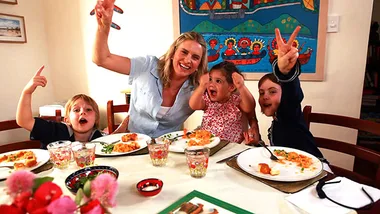A few weeks ago, I witnessed a fascinating encounter between two parents and their respective children. It reminded me of a story that’s been talked about a lot, called The Slap by Christos Tsiolkas originally a book, then produced as a mini-series on the ABC. You might have seen it?
Anyway, at this six-year-old’s birthday party, one child, let’s call her Franki, was kicked, unprovoked, by another child, let’s call her Sylvie. Franki’s parents saw the act, Sylvie’s parents didn’t see the act, but plenty of other people did.
In shock, Franki’s mum ran to her daughter, consoled her and said to Sylvie, in an authoritative yet non-threatening way, “no kicking”. That’s it. Two words. Sylvie was distraught. As you’d expect, perhaps. Being reprimanded by a friend’s parent in front of a lot of people was embarrassing.
Her mother came over and gave her a hug, asked Franki’s mum what happened, who answered “there was a bit of kicking going on” almost talking down the gravity of the situation to avoid further confrontation. Sylvie’s mum continued to console her daughter, then walked away without another word. No apology. No attempt to smooth over the situation and encourage the girls to make up.
The family left the party as though nothing had happened. Afterwards, the remaining friends talked about seeing “The Kick”, the fact that most other parents understand that kids do dumb things, like kick each other, and that it’s cool for the other parent to assume a gentle sense of authority. We wondered why Sylvie’s mum didn’t acknowledge what happened which in turn created even more tension for the next time they catch up, you know?
It made me think about the best way to lay down the law with other people’s children in your own home. When you have rules and boundaries that are adhered to by your children, how do you enforce them on others?
For example, we have very steep stairs in our house, which are gated off to avoid major stacking disasters. When other children come over they often ask to play on the stairs, go up and down the stairs, perform circus acts on the stairs.
If I say yes to other children, how can I expect my own children not to want to continue playing on the stairs when everyone’s gone home? It’s tricky I know. I veer on the side of being the party pooper over the soft touch. Saying yes might be the easy option now, but it means saying no over and over later down the track.
How tough are you when it comes to enforcing your rules on other children? And have you reprimanded other kids in the past? Were there tears and tantrums?


